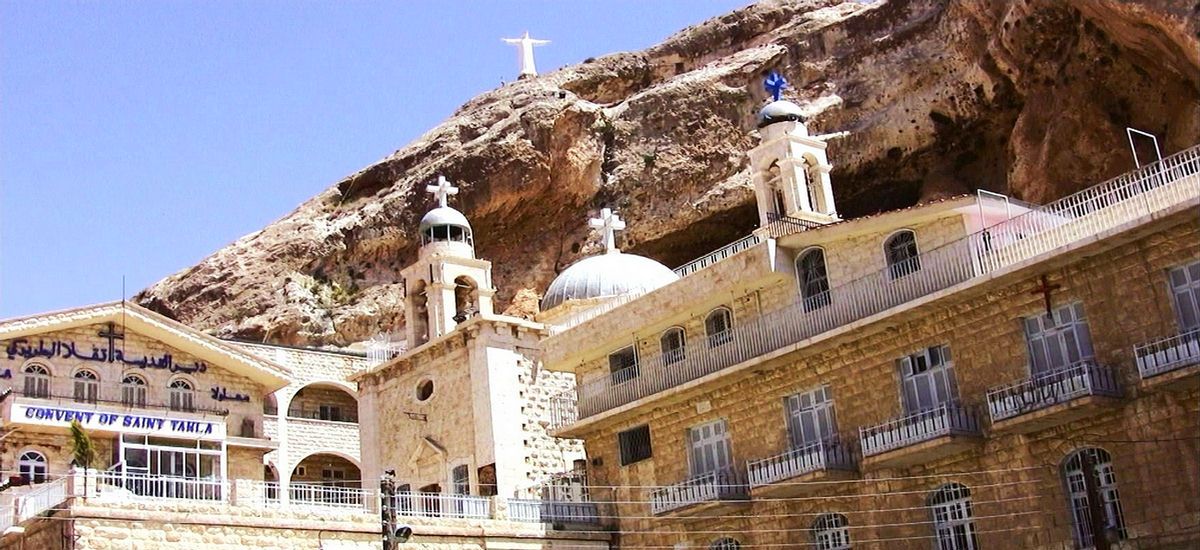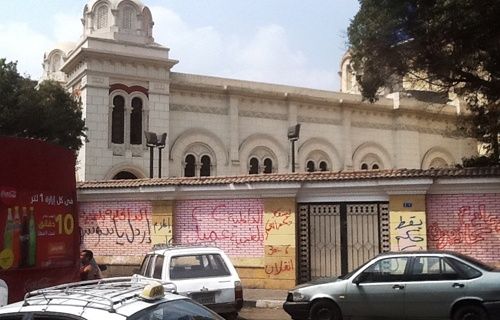
The monastery is in Maaloula, which means "entrance" in Arimaic. It is a vital Christian stronghold in this ancient land with a profound Christian history. It is named after St. Thekla, a disciple of St. Paul who faced a heroic and miraculous martyrdom. These twelve women bring honor to her memory and carry forward the witness to the Gospel in this land ravaged by violence. Pope Francis asked us to " Pray for these sisters and for all the people who have been kidnapped as a result of the ongoing conflict. We must continue to pray and work together for peace, entrusting ourselves to Mary". Maronite Bishop Samir Mazloum asked in an interview with the European press, What fault is it of the nuns and the innocent civilians to become victims and turn into hostages?"Nuns spend their time praying. They do not fight or carry guns." The Greek Orthodox Patriarch of Syria, Youhanna X Yazigi, urged the Jihadist militia Jabhat al-Nusra to return the nuns from St Thekla monastery. He also asked for help from the international community. We appeal to the seed of conscience that God planted in all humans, including the kidnappers, to release our sisters safely. We call upon the international community and world governments to [help secure the] release the nuns of the St Tecla convent.
In the year 1965, Cheikh Arz Loubnan el Khazen, from the house of Cheikh Abi Nassif Nawfak el Khazen from Ballouneh, built a church dedicated to Saint Georges in Chabrouh in Keserwan. Upon his death, the church became under the patronage of Cheikh Salim el Khazen and Faraya’s priest.
In the year 1960, Member of Parliament Cheikh Salim el Khazen from the house of Cheikh Abi Nassif Nawfal el Khazen from ballouneh built a church next to his house in Faraya to honor Our Lady Mary and named it Our Lady of Deliverance Church. The church is still under the patronage of his wife […]
In 1887, Cheikh Daher Mansour Ibrahim el Khazen, from the house of Cheikh Abi Nassif Nawfal el Khazen from Rayfoun, built a church to honor St. Alphonsus in the town of Faraya near his residence. Upon his death, the church and the house were bought by Hanna Khalil from Faraya and then later on […]
Around the year 1740, Cheikh Sakr Abdel Malak, grandchild of Cheikh Abi Nassif Nawfal el Khazen, built a church dedicated to Saint Anthony of Padua in Kfardebian. Later on in the first half of the 19th century, the church became a property of the Maronite Church and was put under the supervision of the […]
During the 17th century, Cheikh Abi Nawfal el Khazen built a 2-storey tower in his territory to protect the surrounding Christian villages from Muslim Shiite attacks and to watch over his lands. Years later and after all Muslim Shiites had left Keserwan in the 18th century, Abi Nawfal’s grandchildren turned the tower into a […]
President Michel Suleiman is expected to make a speech on Saturday during the unveiling of the busts of the 12 Lebanese presidents that have ruled the country since its independence in 1943, reported al-Joumhouria newspaper on Saturday. The daily said that the president will retain the “firm tone” that marked his recent speeches. […]
BEIRUT – General Security chief General Abbas Ibrahim was instructed by President Michel Suleiman to head to Qatar to discuss the fate of the nuns from the Syrian Christian town of Maalula. According to local media outlets, Ibrahim will head to Qatar on Saturday in an attempt to resolve the nuns’ case. LBC television […]

.- Researchers say the Christian population is growing in regions that experience anti-Christian persecution, though this threatens their ability to contribute to societies. “Persecution is growing because Christianity is growing in the places where people are persecuted,” said Todd Johnson of the Center for the Study of Global Christianity at Gordon-Conwell Theological Seminary.
Speaking during a Dec. 5 media call, he characterized anti-Christian persecution as “growing fast.” His research estimates that one in five Christians, 500 million people, currently live in countries where Christians are likely to be persecuted. By 2020, their numbers are expected to rise to 600 million, 25 percent of the Christian population. Johnson noted that the Christian population has significantly shifted from Europe and North America to the “Global South”: Africa, Asia and Latin America.



